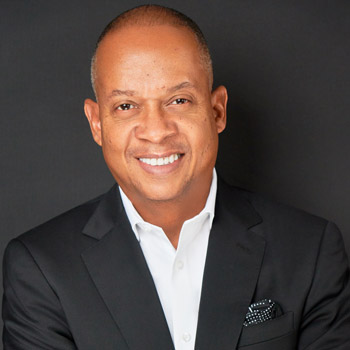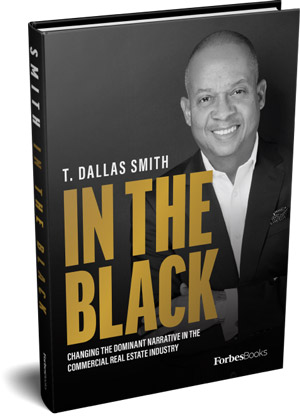T. Dallas Smith, author of “In the Black: Changing the Dominant Narrative in the Commercial Real Estate Industry,” hopes to introduce young Black men and women to a field they may not have previously considered.
Smith is the founder and CEO of T. Dallas Smith & Co., the country’s largest African American-owned commercial real estate brokerage focused exclusively on tenant and buyer representation, according to the firm. “In the Black” shares Smith’s story of entering the Atlanta commercial real estate industry in the 1980s and becoming the first Black broker at Cushman & Wakefield’s Atlanta office.
At the start of 2023, Smith became the first Black president of the Atlanta Commercial Board of REALTORS. He shared some of the lessons learned over his career, and his hopes for the industry, with REIT.com.
You suggest that there is a lot of work to be done in the commercial real estate industry with regards to diversity and inclusion. How do you see this change happening and what can be done right now to bring sustainable, lasting impact to the industry?
The commercial real estate industry has a long way to go in terms of diversity and inclusion. In order to bring sustainable and lasting impact, the industry needs to actively seek out and promote diversity in all aspects. This includes creating more opportunities for underrepresented groups.
What I would say is let’s use the Branch Rickey approach. Branch Rickey (one of the owners of the then “Brooklyn” Dodgers from 1945 to 1950) changed baseball because he was intentional about bringing in a Black player by the name of Jackie Robinson. Rickey’s intentionality, along with Jackie Robinson’s talent and grace, impacted baseball forever by ushering in lasting change and a culture of diversity as it’s exemplified today.
From your perspective, how important is it to start young as an entrepreneur in order to be successful—regardless of race, gender, or ethnicity?
From my perspective, age is not necessarily a determining factor for success in entrepreneurship or in any field really. However, starting young can have some advantages such as more time to learn, fail, and try again. It can also provide you with more time to build a network and gain experience.
Regardless of age, the most important factors for success are having a clear vision, a strong work ethic, a willingness to learn and adapt, and a relentless drive to succeed. Think about the elite athlete, Tiger Woods, who started playing golf when he was four years old and became one of the best golf players in the world. Woods started young and dedicated himself 100% to playing at the highest levels and achieving his goals all the way to the top.
Likewise, if you start business early, start learning the difference between liability, credit, debit, products, services, cash flows, marketing, it can only help you realize your dreams sooner and foster personal and professional growth along the way too.
You mention how influential your instructors at Georgia State University, David Schwartz and Thomas Stanley, were to you as mentors. What do you look for in a mentor and how important is it to work with mentors as you navigate your career?
When looking for a mentor, it's important to find someone who has experience and knowledge in your field. However, you want to find people that also share your values and have a genuine interest in seeing you succeed. Look for someone who challenges you, provides honest feedback, and is willing to share their own experiences and mistakes. It's also important to find a mentor who is willing to invest time and effort into building a meaningful relationship with you.
What’s the best piece of advice anyone ever gave you about how to succeed in commercial real estate?
Always put the client's interests first. This means truly understanding their needs and goals and working tirelessly to find the best solutions for them. In addition, another piece of advice that has resonated throughout my career is to not focus on the commission. Rather, taking care of clients is priority one and if we do that, everything else will turn out okay.
What’s one of the hardest lessons you learned early on in your real estate career?
One of the hardest lessons I learned was the importance of paying attention to detail. I was working on a deal where the floor plan was not an accurate depiction of the physical space. Fortunately, the deal didn't blow up, but the lesson learned was to pay attention to the details; our clients are hiring us to not just locate a good deal but also advise them on the transaction. Essentially, it’s important to represent clients the same way we would represent ourselves, or friends or family.
What has been your biggest breakout moment in your real estate career?
My biggest breakout moment early in my career was when I closed my first major deal, which was a transaction worth more than $20 million. From that experience, I learned the importance of persistence, negotiation skills, and building strong relationships with clients. And timing is everything. We also did a 523,000 square foot deal recently with Microsoft that without a doubt helped to really put our firm on the map.
What has been the biggest gain you have realized as a service-oriented CEO?
Having a service-oriented attitude is essential in both commercial real estate and in life. By putting others first and striving to provide the best service possible, you can build strong relationships, earn trust and respect, and ultimately achieve greater success. As a service-oriented CEO, I have gained the satisfaction of knowing that I have helped others achieve their goals, and in turn, have built a successful and sustainable business.
What would you say to a young professional considering commercial real estate as a career?
The greatest piece of advice I could give is to get started. Some people wait to have everything figured out before they take the first step. Jump in, the water is fine. Additionally, building strong relationships and networking is crucial in this field, so don't be afraid to put yourself out there and make connections. Finally, persistence and hard work are key; success in commercial real estate doesn't come easy, but with dedication and perseverance, it can be achieved.

